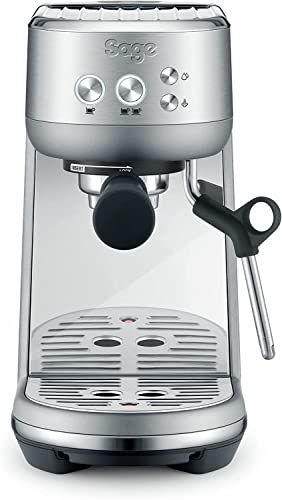Benefits of an Espresso Machine
In an espresso machine, hot water is forced under high pressure through finely ground coffee beans. This results in a smooth and rich drink referred to as espresso.
The first espresso machines were powered by steam. They utilize only one boiler to make several drinks at once. The water is close to boiling when it reaches the "group head," where a portafilter is secured to the.
Health Benefits
The caffeine in espresso can boost people's mood. This is particularly beneficial for those who suffer from depression as it can boost spirits and give them the push they need to get through their day. It also helps with fatigue, another common symptom of depression. Additionally coffee has been proven to improve short-term memory as well as the ability to solve problems. These benefits are also beneficial to office workers who need to remember important details about projects and deadlines.
When people have an espresso machine at home they can make a delicious cup of coffee or cappuccino whenever they want. This saves them money as well as time as they do not have to travel to a coffee shop. It can also be more convenient when entertaining family or friends because they can serve delicious drinks at their home.
When deciding on an espresso machine it is essential to consider how easy it is to use and if there are any extra features, like milk frothers, or a built-in coffee grinder. Make sure to check how many drinks could be made at once and if the machine comes with steam wands for making lattes.
Energy Boost
A coffee maker at home is a great option when guests visit and you're looking to make them an espresso that is delicious. You can also save money by not having to go to a cafe. It's best to buy an espresso machine with a manual mechanism that lets you adjust the amount of water and coffee used, allowing you to manage the strength of your espresso and how much foam (crema) is produced.
There is a manual espresso machine at all appliance stores. These machines have an e-portafilter, which you fill with ground coffee and then compress using a technique called "tamping." You'll have to pump a lever in order to generate the pressure required to extract the flavor from the beans. Some models come with a steam wand that can be used to heat and froth milk so you can make drinks like cappuccinos and lattes.
The super-automatic espresso machine is a more recent improvement. It is like the regular automatic, but provides greater consistency. These machines are programmed to make the specific size of espresso. They are simpler to use, and have received top scores in Lab testing. They can grind beans, measure and tamp them at the touch of one button. Some models come with a built-in coffee grinder and can make espresso and brewed coffee, however they are more expensive than semi-automatic or manual models.
Anti-Inflammatory
Espresso and coffee can provide a healthy boost of energy however, they should be consumed in moderation. This will help you prevent digestive issues, anxiety and high levels of caffeine. It is essential to drink premium coffee to avoid the chemical additives found in lower-quality espresso that could cause harm to your health.
Research has demonstrated that the polyphenols in coffee, such as CGA, have anti-inflammatory properties. They are bacteriostatic and have anti-bacterial properties against a variety of harmful microorganisms that can thrive in different parts of the human body. These include oral bacteria that cause caries as well as intestinal bacteria.
The two diterpenes responsible for coffee's negative effects, cafestol and Kawheol, have been discovered to have anti-inflammatory properties as well as antioxidant and anti-fibrotic properties. A study published in the International Journal of Molecular Sciences suggests that these bioactive compounds are the reason for the positive effects of coffee on the health of humans. CGA has also been associated with lower incidences of disease and a longer life span in other studies.
Get More Information Risk of Diabetes
Many people are seeking ways to lower their risk of developing diabetes in a world where diabetes is becoming more common. Coffee is, in fact, one of the most effective ways to achieve this. Coffee's caffeine boosts metabolism and lowers blood sugar levels following the consumption of a meal. It also decreases the risk of developing type 2 diabetes by lowering cholesterol levels. It is crucial to remember that the amount of caffeine you drink daily should be limited. If you're sensitive to caffeine, it is best that you limit your caffeine intake to a single cup per day.

A new study out of Sweden has confirmed earlier studies that show coffee consumption is associated with lower risk of developing type 2 diabetes. This study is different from other studies in that it distinguished two types of coffee - boiled and filtered to better understand the health effects of coffee.
Researchers employed a technique called metabolomics as an alternative to the traditional questionnaires on diet. This method measures the presence of certain substances in the body and is highly precise compared to the intakes reported by people from questionnaires. Researchers also controlled for factors like sex smoking status, smoking habits and the methods used to prepare coffee to keep out confounding factors from affecting the results.
Scientists are unsure of the exact mechanism at work despite the fact that the results were evident. They believe that the positive effects of coffee could be due in part to diterpenes that hinder the absorption of glucose in the liver. They plan to study these differences further in a future study.
